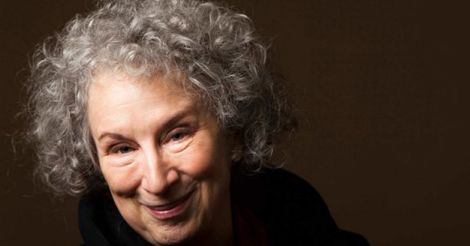Jaipur: Canadian writer Margaret Atwood who is known for foraying into less explored genres of historical, speculative and dystopian fiction, said that she wouldn't take a shot at realms of fantasy and romance.
"There are a number of things which I haven't done and wouldn't put my teeth into like the western novel or the 'Mills and Boons' kind of romantic fiction. I can't write about classic science fiction; about another planet. I also can't write about fantasy and I'm not good at dragons," Atwood says.
The Man Booker Prize winning author and poet who has 15 novels, 17 books of poetry and 10 non-fictions to her credit, is a guest of honour at the five-day long Jaipur Literature Festival here that began on January 21.
In her latest fiction "The Heart Goes Last," the 76-year-old has explored the emergence of a dystopian society following the social and economic collapse in 2008.
She narrates how her jobless protagonist couple (Charmaine and Stan), living out of a car, turn the tables with what in the book is "The Positron Project."
"The novel begins when they are offered an alternate lifestyle inside an experiment called the 'Positron Project.' You live inside a town which has a big wall around it and you don't get out for the duration of your signed period," she explains.
Charmaine and Stan find employment in a prison in Atwood's hypothetical town, Consilience where on alternating months, residents must leave their homes and function as inmates in the Positron prison system.
"For one month you live in the town and act as a guard and the next month is spent in the prison and the month after that you're back," Atwood says.
The genesis of the idea behind the unique project lay in the concept of 'prisons for profit' prevalent in the U.S where the author has consciously set her story. The acclaimed Canadian novelist says she had also participated in several prison protest marches before she set out to write the book.
"In the U.S, there are some pretty big prisons for profit for privately run establishments but the problem is that you don't really make the profits unless you keep the prisons full. Hence, it is an incentive to produce criminals," she said.
Atwood is said to have been influenced by writers like George Orwell, Virginia Woolf, Jane Austen, William Shakespeare, Aldous Huxley, George Eliott and Charles Dickens whose writings have repeatedly featured dystopian societies.
According to her, the period after the two World Wars transformed utopia into an illusory notion, giving way to the rise of the concept of a dystopia.
"A lot of this comes of having lived in the 20th century. People have lived through World Wars and there is an imagining about what I could have done and we all have pretty heroic ideas about what we could have done. Dystopia is a blueprint in which the reader thinks about his possibilities of doing something," she said.
The author feels that the present moment is hanging somewhere between utopia and dystopia. Despite seeming optimistic with scientific developments happening across the globe, the writer who is also a poet novelist and critic warns against phenomena like global warming that are increasingly becoming a threat to mankind.
"Right now we live in both worlds, where on one hand things are going to get better with more feasibility and astonishing discoveries. On the other hand, things are going to get worse with climate change and other things that we've come to know of. Let's see who gets there first - the utopia or the dystopia," said Atwood.
The author is dismissive of categorising literature as high and low and admitted that in the absence of television and other forms of entertainment, she grew up reading "all kinds of books."
"I can read anything. Having grown up in the woods with no television, there was a lot of written material which I turned to. I started reading quite early. I went through whatever was there, which was quite immense," she said.
Unlike many of her contemporaries, Atwood is appreciative of the rise of the Internet which she says is creating a lot of platforms for children to be able to access writing.
The writer has an upcoming comic book whose superhero Angel Catbird part cat and part bird. She is also part of a newly formed tradition called "Hogarth Shakespeare Project" where contemporary bestselling and celebrated authors have come together to re-imagine the playwright's plays.
Atwood and her team's rendition of "The Tempest" titled "Hag Seed" is scheduled to be published later this year, she said.
(With agency inputs)
























 Margaret Atwood. Photo: Reuters
Margaret Atwood. Photo: Reuters
Disclaimer
The comments posted here/below/in the given space are not on behalf of Manorama. The person posting the comment will be in sole ownership of its responsibility. According to the central government's IT rules, obscene or offensive statement made against a person, religion, community or nation is a punishable offense, and legal action would be taken against people who indulge in such activities.